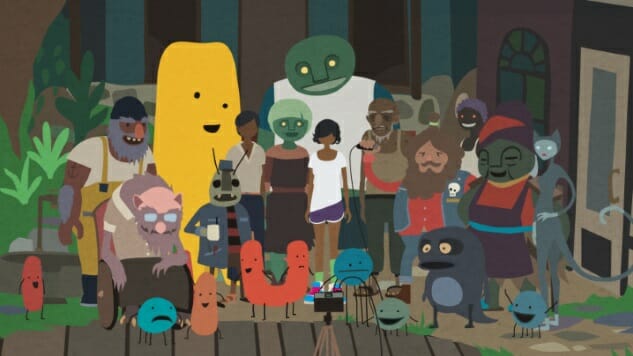
Recently I realized I am deeply unhappy with my workspace. The area where I write and game is also where I live, and lately, it’s become a bit too familiar. In the four years since I moved into my condo, I’ve done nothing to make it my own, content with the hand-me-downs my husband and I have been using since we moved in together 12 years ago. I haven’t done a lot to be proactive in my environment, and the repetition seems to be getting to me. It’s time to make my surroundings a reflection of my tastes.
Part of that process, I decided, is to bring in plants. I miss them. At my last apartment, I had a long balcony where I grew peppers and tomatoes, and despite the messiness of urban gardening, it was very soothing. Horticulture requires patience and care but the results are gratifying. I felt peace in nurturing their growth, even if (on a cosmic level, at least) I could take so little credit for it. It became a comforting part of my daily routine, an anchor providing structure even on my scattered days. I used to watch my cat nestle deep in the branches, closing his eyes and raising his chin to the air as the breeze washed over the leaves and brushed his face. Later I’d find tiny tomatillos and chocolate mini bell peppers, dried out and full of teeth holes, lying in some corner of the house, abandoned after hours of play.
Mutazione is about the biological orchestra of plant life. In the game, a young girl named Kai returns to her family village to meet her dying grandfather for the first time. Over the course of the week, she comes to understand his role as a botanist and healer and how his presence has affected the small town, the residents of which have all been deeply affected by a chain of tragedy relating to an asteroid that fell on their village decades ago. Under his tutelage Kai learns to tend the local flora, running errands for her neighbors and helping them find healing through her plants. As she collects seeds across seven gardens, she also comes to intimately understand the cycle of death and rebirth that calibrates the emotional harmony of the town. Each garden is tuned to a certain mood, with growth induced by a special drum song that coaxes them to maturation, their individual vibrations coming together to create a full song.

The premise of Mutazione might seem inconsequential but underneath it lies a poetic nod to the therapeutic sentience of plants. While there is a lot of debate over the extent of their consciousness, there’s evidence that plants resonate with enough energy to communicate, whether in distress or even in song. Those same frequencies may be responsible for their soothing qualities, or why they seem to respond to music and sound. There are some that even say that trees and plants sing, be it a mixture of passive sounds like the brush of grass stem in the wind or the patter of rain on broadleaf, to the electricity that resonates deep within a tree trunk. The choir surrounds us all the time, affecting us in ways we’ve yet to fully understand.
That’s the feeling I’m chasing as I make my own garden. I added several air-circulating houseplants to my living room last month, along with a couple dozen succulents and a home hydroponics system that sits on my kitchen counter. Even just the constant sight of green seems to be a mood lifter. The nurturing process has also become a healthy distraction, something my nervous energy can assign some background attention to as I go about my day. There’s also a joy in the anticipation and the payoff. It’s among the few things I can be patient about. It’s as if for all my lack of control in the universe, I can still prune or shape the miracle of life in some small way.
Mutazione tackles several topics in the course of its five-hour experience, particularly the themes of traditional healing, outside interference and the perils of harboring a savior complex. Kai’s grandfather, while well-intentioned, triggers a chain of events that leads to tragedy, disrupting the emotional and spiritual health of the village. His interference is reflected in the slow but devastating disruption to the local ecosystem, a slow decay that isn’t addressed until his illness nearly leaves the town without a healer at all. It is only after Kai surrenders to the traditional wisdom of the elders that order and health are restored. Her grandfather’s method of teaching forces her to figure out the basics on her own, gifting her with an intuition that can only be learned through the trial and error process of hands-on work. In that way, the game is also a metaphor for her growth into adulthood.
While I’ve finished the game and can no longer visit the gardens I grew in Mutazione, their impact lingers. Had I not played it, my return to horticulture probably wouldn’t have kicked into high gear. As I add new specimens to my collection, recreating the conditions of their natural environment, each one brings something new to the room. A splash of color and a smattering of contrasting textures, sticking out like rough paintbrushes in a tin can. They fill a space where something was missing. Perhaps as I calibrate and adjust each plant, like sound engineers carefully mixing a tune, my own harmony will soon emerge.
Holly Green is the assistant editor of Paste Games and a reporter and semiprofessional photographer. She is also the author of Fry Scores: An Unofficial Guide To Video Game Grub. You can find her work at Gamasutra, Polygon, Unwinnable, and other videogame news publications.